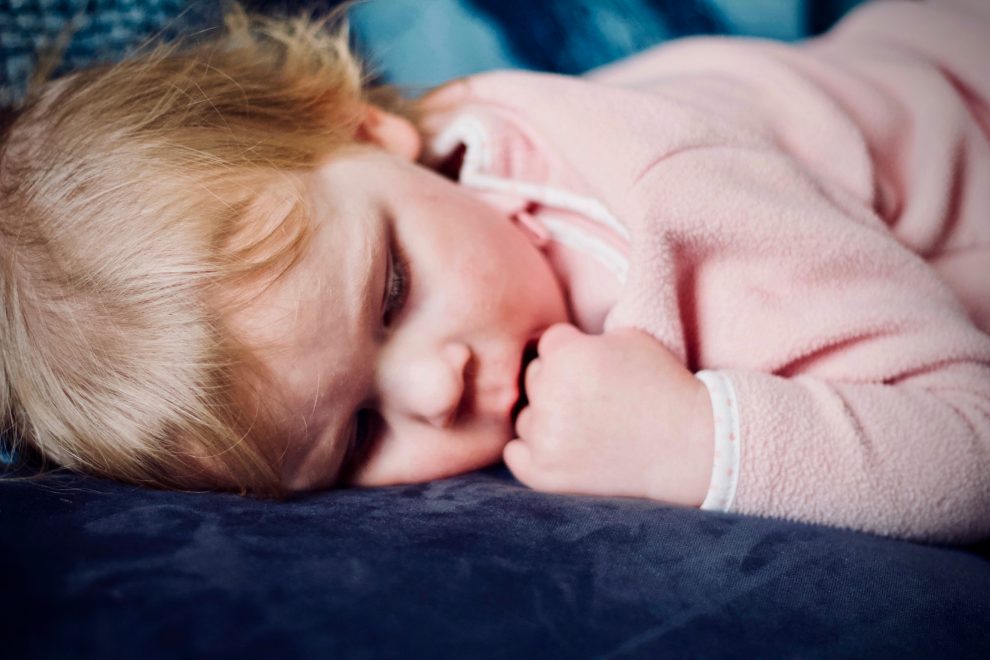Five minutes before my children go to bed, I am not feeling very holy. They are tired and I am exhausted. There are blue globs of toothpaste in the sink basin because Jamie, 5, isn’t tall enough to spit right into the drain. There is often a trail of kids’ toys, books, and clothes leading from the family room to the bedrooms. Sometimes I have the kids clean up this trail before bed, but other times I don’t mention it, simply because I cannot summon the energy to supervise one more activity.
Once the jammies are on and the final book has been read (“I will not eat them on a boat. I will not eat them with a goat.”) the kids climb into their beds, and I walk from room to room for a final goodnight blessing.
It used to be that I just prayed with the children, I didn’t bless them. The arrival of our foster daughter, at age 6, changed that. From the day we welcomed her home, as I learned about the abuse and neglect she had suffered, I felt more and more afraid for her—and less equipped to be the parent she would require.
A close friend, hearing of my fears, had brisk, no-nonsense advice for me: “Lay your hands on her,” she said. “Bless her every night. You can’t heal this child, but God can.”
Not knowing what else to do, I took my friend’s words to heart.
That night, as Teenasia lay on her back in the darkness, I knelt next to her bed. I placed one hand on her head, and traced the sign of the cross on her forehead. What to say? I didn’t want to alarm her by bringing up her past, yet I wanted a strong blessing to bring about healing. I looked within myself for what my deepest hope was for her.
“God, bless Teenasia and help her to become the Teenasia you created her to be,” I finally said.
Leaving Teenasia’s room that night, I thought about what I had said, and discovered that truly, this is what I wanted for all four of my children—that God would guide them to grow into their very best selves. I wanted each one to live a life that was a response to God.
Now, eleven months after that first blessing, I am still making the sign of the cross on Teenasia’s forehead every night, and often on my other children’s foreheads, too. I have added to the blessing—sometimes thanking God for Liam’s work ethic or that Jamie can now ride a two-wheeler. The essence of the blessing remains the same, however—a prayer that God will help that child to become the person he or she was created to be.
I have found that there is something about this act of blessing that feels different—that feels more powerful—than simply praying with my children. Within the Catholic tradition, a blessing signifies a sanctification or dedication of a person or thing to a sacred purpose.
At the end of the day, there is nothing that my children and I need more than to be dedicated to a sacred purpose. Too often our days are consumed with purposes no more sacred than multiplication problems and emptying the dishwasher. Blessings provide us with a reminder that we were created for holiness.
Every blessing has two parts: praising God and praying for God’s gifts. In Christ, God the Father “with every spiritual blessing” blesses Christians (Eph. 1:3). This is why blessings usually include the sign of the cross.
While some blessings are reserved for ordained ministers—especially if the blessing is part of a sacrament—our church teaches that laypeople are called to bless others and are especially encouraged to do so within the family. “The baptismal priesthood” is the official term used by the church to explain why I can bless my kids. I prefer to think of it simply as a perk of my baptism.
While prayers can meander as a child starts requesting aid for every family member with a sore throat, a cut finger, or a big test the next day, a blessing is more compact and to the point. In the act of tracing the cross on their foreheads, I am acknowledging my own role as a leader and teacher in my children’s faith life.
And because only I am speaking during the blessing—not my children—they are more open and receptive than they are at any other time during the day. For a moment (and often only a moment), their chattering stops and they do nothing but lay still and silent, receiving their blessing.
As tired and cranky as the kids or I may be right before bed, the before-bed blessing smoothes out the end of the day. It reminds all of us why we’re here and speaks to us of God’s plan for our lives. The before-bed blessing concludes my children’s day by pulling us both to a higher place, a place where God, if invited, will lead and shape.
This article appeared in the January 2009 issue of U.S. Catholic (Vol. 74, No. 1, pages 37-38).














Add comment